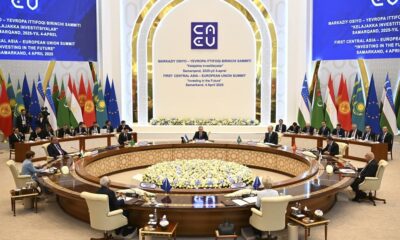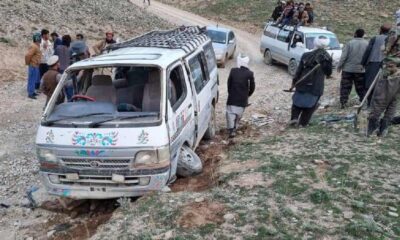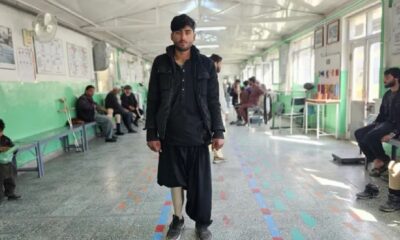Regional
Egypt’s Sisi makes first presidential visit to Turkey in 12 years
Erdogan met Sisi at Ankara airport on Wednesday and the two then travelled in the same car to the presidential palace for around two hours of talks.
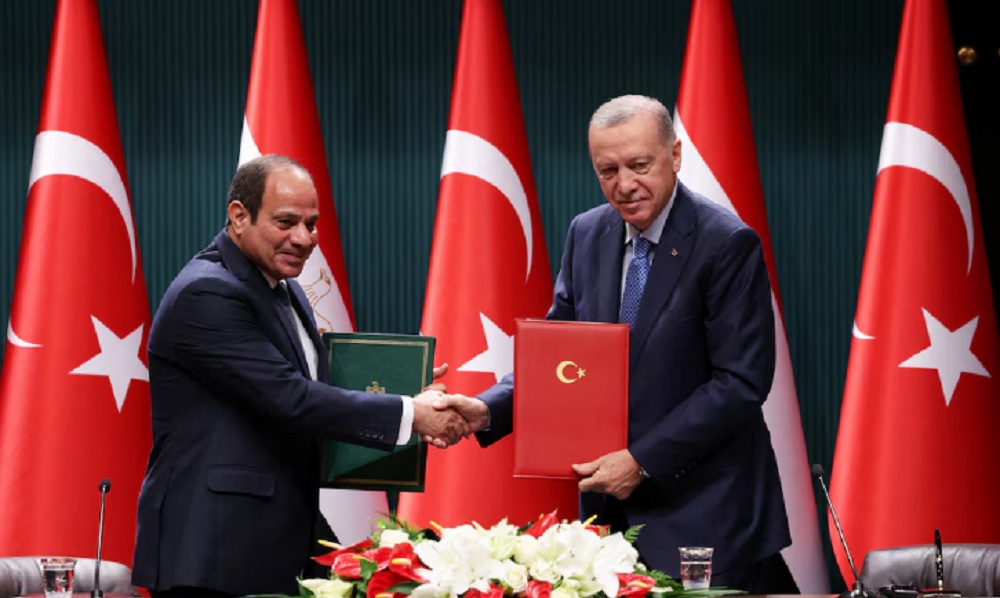
Turkish President Tayyip Erdogan and Egyptian counterpart Abdel Fattah al-Sisi discussed the Gaza war and ways to further repair the long-frozen ties between the regional powers during talks in Ankara, in the first such presidential visit in 12 years.
Relations between Ankara and Cairo collapsed in 2013 after Egypt’s then-army chief Sisi led the ousting of the Muslim Brotherhood’s Mohamed Mursi, a Turkish ally who had become Egypt’s first democratically elected president the year before, Reuters reported.
Ties between the two countries began thawing in 2020 when Ankara launched a diplomatic drive to ease tensions with its estranged regional rivals, including the United Arab Emirates, Saudi Arabia and Egypt.
Last year, Ankara and Cairo mutually reappointed ambassadors and Turkey said it would also provide Cairo with armed drones. Erdogan travelled to Cairo in February for his first trip to Egypt since 2012.
He met Sisi at Ankara airport on Wednesday and the two then travelled in the same car to the presidential palace for around two hours of talks.
“With a win-win mindset, we will carry our multi-dimensional ties forward,” Erdogan said, adding Ankara particularly wanted to deepen ties with Egypt on natural gas and nuclear energy.
Ministers from the two countries signed 18 memorandum of understanding on cooperation in energy, defence, tourism, health, agriculture, finance, culture, education, and transport.
Speaking at a joint press conference, Erdogan reiterated that Turkey and Egypt wanted to boost annual trade by $5 billion to $15 billion in the next five years.
He added that Ankara and Cairo shared a “common stance” on the Palestinian cause, while Sisi said they were both calling for a ceasefire in Gaza and an end to violence in the West Bank.
Turkey, which has condemned Israel for its war against Hamas militants in Gaza, has sent thousands of tonnes of aid to Egypt for Palestinians and praised Cairo’s humanitarian efforts and role as negotiator in the talks on a ceasefire and hostage deal.
Sisi said they also discussed the situation in Libya, over which the two countries have long been at odds and backed opposing factions in an unresolved conflict.
“We stress that it is important to turn the page on the ongoing crisis through holding presidential and parliamentary elections simultaneously with the exit of illegal foreign forces and mercenaries from the country, and put an end to the presence of armed militias to end the division,” he said.
Regional
Israel steps up Syria strikes, says Turkey aims for ‘protectorate’

Israel stepped up airstrikes on Syria, declaring the attacks a warning to the new Islamist rulers in Damascus as it accused their ally Turkey on Thursday of trying to turn the country into a Turkish protectorate.
Later on Thursday, Turkey said Israel must withdraw from Syria and stop harming stabilization efforts there, Reuters reported.
“Israel has become the greatest threat to regional security” and is a “strategic destabilizer, causing chaos and feeding terrorism,” the Foreign Ministry in Ankara said.
“Therefore, in order to establish security throughout the region, Israel must first abandon its expansionist policies, withdraw from the territories it occupies, and stop undermining efforts to establish stability in Syria,” it said.
The strikes, targeting a site near Damascus and air bases, put renewed focus on Israeli concerns about the Islamists who deposed Bashar al-Assad in December, with Israeli officials viewing them as a rising threat at their border.
Also suspicious of Ankara’s sway over Damascus, Israel has been working to advance its goals in Syria since Assad was toppled, seizing ground in the southwest, declaring a willingness to protect the Druze minority, lobbying Washington for a weak state, and blowing up much of the Syrian military’s heavy weapons and equipment in the days after Assad fell.
The Israeli army said its forces operating in the southwest overnight killed several militants who opened fire on them. They were on a targeted mission at the time beyond the separation zone where they are deployed inside Syria, it said.
Syria’s state news agency SANA said Israeli shelling had killed nine people in the area, during what it described as the deepest incursion yet by Israeli troops in the area.
Israeli Defence Minister Israel Katz said the airstrikes late on Wednesday evening were “a clear message and a warning for the future – we will not allow the security of the State of Israel to be harmed.”
Katz said in a statement that Israel’s armed forces would remain in buffer zones within Syria and act against threats to its security, warning Syria’s government it would pay a heavy price if it allowed forces hostile to Israel to enter.
Reflecting Israeli concerns about Turkish influence in the new Syria, Foreign Minister Gideon Saar accused Ankara of playing a “negative role” there, in Lebanon and other regions.
“They are doing their utmost to have Syria as a Turkish protectorate. It’s clear that is their intention,” he told a press conference in Paris.
The Syrian Foreign Ministry said the Israeli strikes were an unjustified escalation aimed at destabilising the country, calling on the international community to put pressure on Israel to “stop its aggression.”
Later on Thursday, Israeli strikes targeted the town of Kiswah, south of Damascus, according to Syria’s state news agency. There were no immediate reports of casualties and no immediate comment from the Israeli military.
Israel bombed Syria frequently when the country was governed by Assad, targeting the foothold established by his ally Iran during the civil war.
AIR BASE DESTROYED
The latest strikes were some of the most intense Israeli attacks in Syria since Assad was toppled.
The Syrian Foreign Ministry said Israel struck five separate areas within a 30-minute window, resulting in the near-complete destruction of the Hama air base and wounding dozens of civilians and soldiers.
The Israeli military said it had struck remaining military capabilities at air bases in Hama and Homs provinces, in addition to remaining military infrastructure in the Damascus area, where Syrian media and officials said the vicinity of a scientific research facility was hit.
In Hama, a Syrian military source told Reuters a dozen strikes demolished the runways, tower, arms depots and hangars at the military airport. “Israel has completely destroyed Hama air base to ensure it is not used,” the source said.
Israel also said on Wednesday it targeted the T4 air base in Homs province, which it has repeatedly hit over the past week.
In the incident in southwestern Syria, the Israeli military said its forces were operating in the Tasil area, “confiscating weapons and destroying terrorist infrastructure” when several militants fired on them.
Residents of the Tasil area reached by phone said a group of armed locals were killed after confronting an Israeli army contingent that had arrived in the area to destroy a former Syrian army encampment.
The Israeli military said there were no casualties among its forces who “responded with fire and eliminated several armed terrorists from the ground and air.”
“The presence of weapons in southern Syria constitutes a threat to the State of Israel,” it said. “The IDF will not allow a military threat to exist in Syria and will act against it.”
Regional
Military confrontation seems inevitable if no new Iran nuclear deal, France says
Western powers say the nuclear programme amounts to a disguised effort to develop an atomic bomb. Iran has long denied seeking nuclear weapons.

France’s foreign minister warned on Wednesday that if world powers were unable to quickly reach a new agreement with Iran over its contested nuclear programme then a military confrontation seemed “almost inevitable”.
Speaking after President Emmanuel Macron convened a rare and undisclosed meeting of key ministers and experts on Wednesday to discuss the Iran dossier, Jean-Noel Barrot appeared to ramp up the pressure on Tehran.
European powers are seeking to create a diplomatic path with a view to getting an agreement to curb Iran’s uranium enrichment activity by the summer and ahead of an October 2025 deadline, when U.N. sanctions related to a 2015 accord on Iran’s nuclear programme with world powers expire.
Western powers say the nuclear programme amounts to a disguised effort to develop an atomic bomb. Iran has long denied seeking nuclear weapons.
“The window of opportunity is narrow. We only have a few months until the expiration of this (2015) accord. In case of failure, a military confrontation would seem to be almost inevitable,” Barrot told a parliamentary hearing.
The earlier cabinet meeting, confirmed by three diplomatic sources, is rare and highlights mounting concern among Washington’s European allies that the United States and Israel could launch airstrikes on Iran’s nuclear facilities unless there is a quick negotiated deal on its nuclear programme.
The U.S. has reinforced military capabilities in the Middle East with more warplanes, the Pentagon said on Tuesday, amid a U.S. bombing campaign against the Houthis who control much of Yemen and are supported by Iran.
A senior European official said European strategists were asking themselves whether the campaign could be a precursor to a U.S. strike on Iran in the coming months.
Trump, who has urged Supreme Leader Ayatollah Ali Khamenei to engage immediately in negotiations, threatened Iran on Sunday with bombing and secondary tariffs if it did not come to an agreement over its nuclear programme.
The foreign minister of Iran’s direct adversary Israel will be in Paris on Thursday.
Diplomatic sources said ministers from France, Britain and Germany, all party to the 2015 deal, were hoping to discuss the Iran dossier with U.S. Secretary of State Marco Rubio when they convene in Brussels for a NATO ministerial meeting this week.
Trump withdrew the U.S. from the 2015 deal that placed strict limits on Tehran’s nuclear activities in exchange for sanctions relief.
Since then, Iran has far surpassed that deal’s limits on uranium enrichment, producing stocks at a high level of fissile purity, well above what Western powers say is justifiable for a civilian energy programme and close to that required for nuclear warheads.
The European powers have sought to raise pressure on Iran to coax it back into nuclear discussions. They have held several rounds of talks with Iran including at technical level last week, to try to lay the groundwork.
But the Trump administration has focused initially on a campaign of “maximum pressure”, and the Europeans have found coordination complicated, diplomats say.
The European powers, who can invoke a return of full UN sanctions before October, had hoped to convince Iran to begin negotiating new restrictions on its nuclear activities with a view to having a deal by August at the latest.
That would give enough time to set new limits for Iran’s programme and begin lifting sanctions before the 2015 accord expires in October 2025.
Regional
China launches military drills around Taiwan, calls its president a ‘parasite’

China began joint army, navy and rocket force exercises around Taiwan on Tuesday as a “stern warning” against separatism and called Taiwanese President Lai Ching-te a “parasite”, as Taiwan sent warships to respond to China’s navy approaching its coast.
The exercises around the democratically governed island, which China views as its own territory and has never renounced the use of force to bring under its control, come after Lai called Beijing a “foreign hostile force” last month, Reuters reported.
China detests Lai as a “separatist,” and in a video accompanying the Eastern Theatre Command’s announcement of the drills depicted him as cartoon bug held by a pair of chopsticks above a burning Taiwan, calling him in English a “parasite”.
“The focus is on exercises such as combat readiness patrols at sea and in the air, seizing comprehensive control, striking maritime and land targets, and imposing blockade controls on key areas and routes,” the Eastern Theatre Command said in a statement.
Taiwan’s government condemned the drills, with the presidential office saying China was “widely recognised by the international community as a troublemaker” and that the government has the confidence and ability to defend itself.
Taiwan’s government rejects Beijing’s sovereignty claims, saying only the island’s people can decide their future.
Two senior Taiwan officials told Reuters that more than 10 Chinese military ships had approached close to Taiwan’s 24 nautical mile (44 km) contiguous zone and Taiwan sent its own warships to respond.
However, Taiwan has not detected any live fire by the Chinese military, one of the officials said.
TAIWAN DISPATCHES WARSHIPS
Taiwan’s Defence Ministry said in a statement that China’s Shandong aircraft carrier group had entered the island’s response area on Monday, adding that it had dispatched military aircraft and ships and activated land-based missile systems in response.
The drills took place after U.S. Defense Secretary Pete Hegseth left the region following visits to Japan and the Philippines, where he criticised China and said Japan was “indispensable” for tackling Chinese aggression.
A senior Taiwan security official told Reuters, citing internal assessments, that Beijing needed to avoid any “perceived confrontation” with Washington prior to the U.S.-China trade talks, and thus Taiwan has become a pretext.
“Taiwan is their best excuse. That’s why they chose to launch such military drills as soon as the U.S. defence secretary left Asia,” the official said.
The de facto U.S. embassy, the American Institute in Taiwan, said the United States will continue to support the island.
“Once again, China has shown that it is not a responsible actor and has no problem putting the region’s security and prosperity at risk,” a spokesperson said in a statement.
“CLOSING IN”
China’s military released a series of propaganda videos in quick succession after the drill announcement, depicting Chinese warships and fighter jets encircling Taiwan, Taipei being aimed at from above, and military vehicles patrolling city streets.
A video of a poster accompanying the drills titled “Closing In,” and showing Chinese forces surrounding the island, was released on the Eastern Theatre Command’s Weibo.
This was followed by a video titled “Shell”, depicting president Lai as a green cartoon bug spawning parasites across the island, on the Eastern Theatre Command’s WeChat page.
“Parasite poisoning Taiwan island. Parasite hollowing Island out. Parasite courting ultimate destruction,” the animation said.
Taiwan Defence Minister Wellington Koo said such rhetoric was not conducive to peace and “shows their provocative character,” when asked about Lai’s cartoon depiction.
A third video, “Subdue Demons and Vanquish Evils”, featured Sun Wukong, the magical monkey king from the Ming Dynasty epic “Journey to the West” as he is depicted in the “Black Myth: Wukong” hit video game.
It opens with the video’s title flashing across the screen and the Chinese mythical warrior riding on clouds before cutting to footage of Chinese fighter jets.
“The joint exercise and training conducted by the Eastern Theatre of the Chinese People’s Liberation Army (PLA) in the vicinity of Taiwan Island is a resolute punishment for the Lai Ching-Te authorities’ rampant ‘independence’ provocations,” said Zhu Fenglian, a spokesperson for China’s Taiwan Affairs Office.
Taiwan’s Koo told reporters the PLA should focus first on resolving its issues with corruption instead of destroying peace and stability in the region.
China’s military has undergone a sweeping anti-corruption purge over the past few years, which saw former Chinese Defence Minister Li Shangfu ousted in October 2024.
China’s defence ministry did not immediately respond to a request for comment on Koo’s remarks.
The Taiwan security source, citing internal intelligence assessments, said China was trying to busy its military with exercises as a way of distracting and stopping its soldiers from discussing the corruption crackdown amongst themselves on base.
China’s coast guard said it was also taking part in the drills, saying it was simulating “inspection and capture, interception and detention operations against unwarranted vessels” to show its exercise of “legitimate jurisdiction” over Taiwan.
The Global Times, which is owned by the People’s Daily newspaper of the governing Chinese Communist Party, said the drill had not been given a code name to show that Chinese military forces surrounding the island “has become a normal practice,” citing Zhang Chi of National Defence University.
“Through a series of exercises held in the Taiwan Strait in recent years, the PLA has strongly enhanced its ability to prepare for war and fight battles,” the article on the paper’s Weixin social media page added.
China has staged several rounds of war games around Taiwan since then-U.S. House Speaker Nancy Pelosi visited Taipei in 2022.
-

 World5 days ago
World5 days agoMyanmar quake death toll hits 1,700 as aid scramble intensifies
-
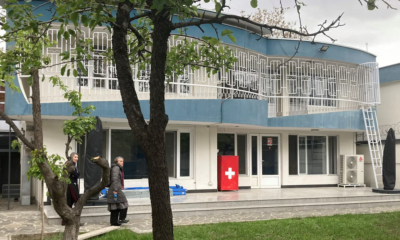
 Latest News4 days ago
Latest News4 days agoSwitzerland re-establishes presence in Kabul with humanitarian office
-
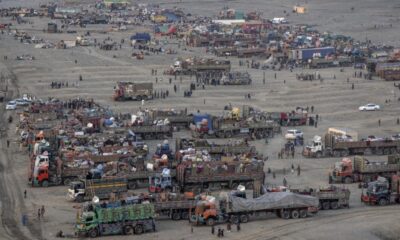
 Latest News4 days ago
Latest News4 days agoPakistan plans to expel 3 million Afghan refugees this year
-

 World4 days ago
World4 days agoSouth Korea, China, Japan seek regional trade amid Trump tariffs
-
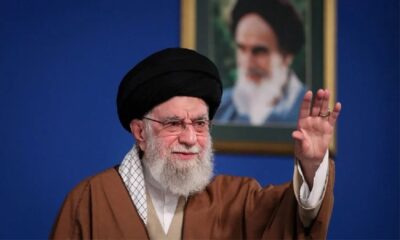
 Regional4 days ago
Regional4 days agoIran’s Khamenei warns of ‘strong’ response if US attacks
-

 Latest News3 days ago
Latest News3 days agoAfghanistan’s reconstruction is in the interest of EU: Uzbek president
-

 Latest News3 days ago
Latest News3 days agoUS won’t rest until all Americans detained in Afghanistan brought home: Rubio
-

 Latest News3 days ago
Latest News3 days agoBulgaria brings five people to trial over deaths of 18 Afghan migrants


